Unit 2 Keeping Healthy考点精析课件(仁爱科普版八年级上册)
文档属性
| 名称 | Unit 2 Keeping Healthy考点精析课件(仁爱科普版八年级上册) | 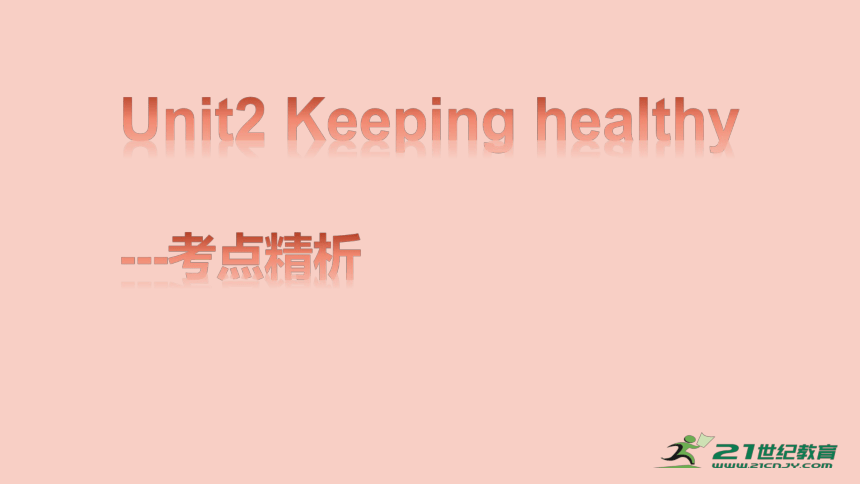 | |
| 格式 | pptx | ||
| 文件大小 | 268.9KB | ||
| 资源类型 | 试卷 | ||
| 版本资源 | 仁爱科普版 | ||
| 科目 | 英语 | ||
| 更新时间 | 2023-09-08 14:18:49 | ||
图片预览



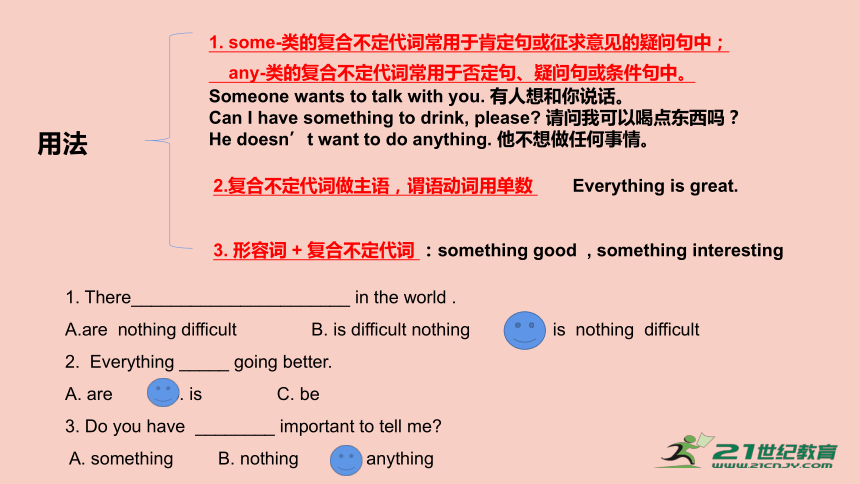
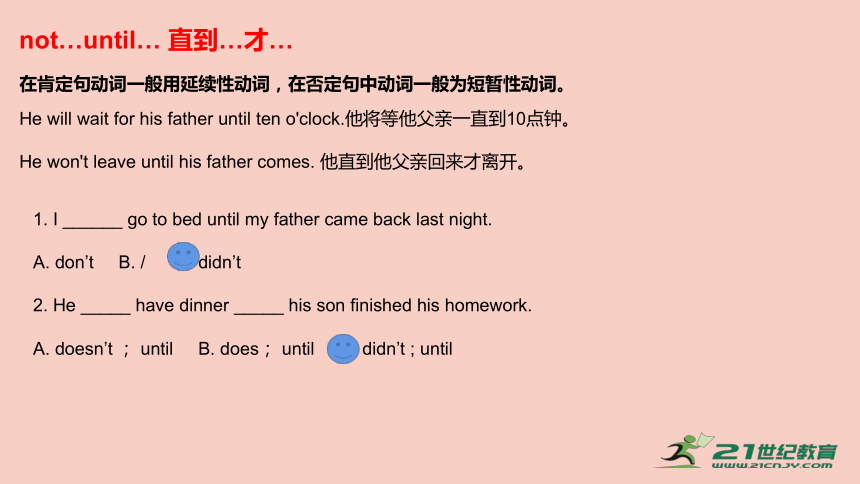

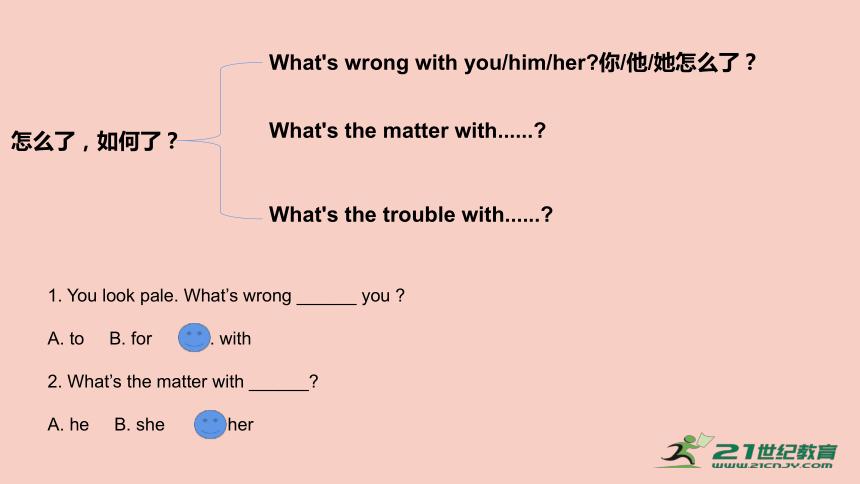

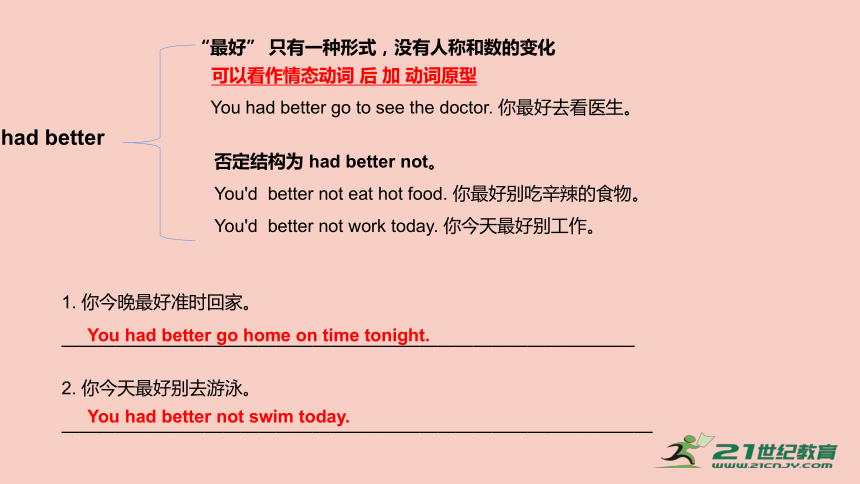
文档简介
(共22张PPT)
Unit2 Keeping healthy
---考点精析
Topic1 You should see a dentist.
worry
worry about/over sb./sth. (为某人/某事物而感到烦恼)
She worries about her son's safety when he goes out at night.
be worried about/for sb./sth. (为某人/某事物担心)
例句:The parents are worried about their children's safety.
1. -The radio says it will rain tomorrow.I am _______about our trip.
A. worry B. worries C. worried
2. He _______ about his son's safety when he goes out at night.
A. worrys B. worries C. worried
复合不定代词及用法
1. 复合不定代词的构成:复合不定代词是由some-,any-,no-,every-加上-one,-body,-thing所组成的不定代词。
1. some-类的复合不定代词常用于肯定句或征求意见的疑问句中;
any-类的复合不定代词常用于否定句、疑问句或条件句中。
Someone wants to talk with you. 有人想和你说话。
Can I have something to drink, please 请问我可以喝点东西吗?
He doesn’t want to do anything. 他不想做任何事情。
用法
2.复合不定代词做主语,谓语动词用单数 Everything is great.
3. 形容词 + 复合不定代词 :something good , something interesting
1. There______________________ in the world .
A.are nothing difficult B. is difficult nothing C. is nothing difficult
2. Everything _____ going better.
A. are B. is C. be
3. Do you have ________ important to tell me
A. something B. nothing C. anything
not…until… 直到…才…
在肯定句动词一般用延续性动词,在否定句中动词一般为短暂性动词。
He will wait for his father until ten o'clock.他将等他父亲一直到10点钟。
He won't leave until his father comes. 他直到他父亲回来才离开。
1. I ______ go to bed until my father came back last night.
A. don’t B. / C. didn’t
2. He _____ have dinner _____ his son finished his homework.
A. doesn’t ; until B. does; until C. didn’t ; until
许多,大量
many+ 可数名词复数 much+不可数名词
a lot of / lots of + 可数复数/ 不可数名词
plenty of+ 可数复数/ 不可数名词
There ____ lots of water in the glass.
A. are B. am C. is
2. I have _______ of books . I will give you some.
A. lot B. many C. plenty
怎么了,如何了?
What's wrong with you/him/her 你/他/她怎么了?
What's the matter with......
What's the trouble with......
1. You look pale. What’s wrong ______ you
A. to B. for C. with
2. What’s the matter with ______
A. he B. she C. her
look
“看起来”,作连系动词,后接形容词。
连系动词还有 tast ,sound ,smell ,feel 。
动词 观察,注意,看 ; look at ... 看,注意。。。
The soup tastes very delicious. 这汤尝起来真香。
Your voice sound nice. 你的声音听起来很动人。
The flowers smell sweet. 这些花闻起来很香。
The silk feels smooth 丝绸摸起来很光滑。
1. He _____ so plae. What’s wrong with him
A. looked B. look C. looks
2. Look __ the sky . It’s blue.
A. in B. at C. about
had better
“最好” 只有一种形式,没有人称和数的变化
可以看作情态动词 后 加 动词原型
You had better go to see the doctor. 你最好去看医生。
否定结构为 had better not。
You'd better not eat hot food. 你最好别吃辛辣的食物。
You'd better not work today. 你今天最好别工作。
1. 你今晚最好准时回家。
————————————————————————————————
2. 你今天最好别去游泳。
—————————————————————————————————
You had better go home on time tonight.
You had better not swim today.
Topic2 I must ask him to give up smoking.
情态动词
定义
情态动词本身有各种意义,但不能单独作谓语,只能和主要动词一起构成谓语,表示说话人的语气、情感和态度,这样的动词称为情态动词。情态动词没有人称和数的变化。
常用的情态动词有can, could, may, might, must, have to, will, would, shall, should, need, dare等。
1. can, could 的用法
1). 表示能力、技能。
例:She can swim fast, but I can’t. 她能游得快,但我不能。
Can you swim 你会游泳吗?
2). 表示请求和允许。
例:--- Can I go now 我现在可以走了吗?
---Yes, you can. ( No, you can’t.)
3). 表示推测,意为“可能”,常用与否定句和疑问句中,此时can’t意为“不可能”。
例:Can the news be true 这个消息会是真的吗?
This can’t be done by him. 这个不可能是他干的。
4). 在疑问句中,此时could并不是can的过去式,只是表示委婉的语气。
例:--- Could you do me a favor 您能帮我个忙吗?
--- Yes, I can. (No, I’m afraid not.)
是的,我能。(不,我恐怕不能。)
5). 表示客观可能性(客观原因形成的能力)。
例:They’ve changed the timetable, so we can go by bus instead.
他们已经改变了时刻表,因此我们可以乘公交车去。
This hall can hold 500 people at least.
这个大厅至少可以容纳500个人。
1. can, could 的用法
1、 _________ you help me answer the telephone
A.May B.Can C.Must D.Need
2、 --- Mum, _________ I play computer games
---Yes, you can, but you have to finish your homework first.
A.would B.must C.may D.need
3、 ---Must I hand in all my money, Mum
---No, you _________. You can use it to buy some school things.
A.mustn’t B.can’t C.needn’t D.should
2. may, might的用法
1). 表请求和允许,might比may语气更委婉,而不是过去式。
例:You may take whatever you like. 你喜欢什么就拿什么。
--- May (Might) I smoke here 我可以在这里吸烟吗?
--- Yes, you can. (No, you can’t/ mustn’t.)
是的,你能。(不,你不能/禁止。)
2). 表示推测可能(不用于疑问句),might不是过去式,它所表 示的可能性比may小。
例:He may/ might be busy now.
他可能现在很忙吧。
Your mother may/ might not know the truth.
你妈妈可能不知道真相。
3. must, have to的用法
1). 两词都表示“必须、必要”的意思。have to强调客观需要,must是说话人主观的看法。
例:My brother was very ill, so I had to call the doctor in the middle of the night.
--- Must we hand in our homework today
---Yes, you must. ( No, you don’t have to/ you needn’t.)
是的,你必须。(不,你不必。)
2). have to有人称、数、时态的变化,而must只有一种形式。
例:He had to look after his sister at home yesterday.
3). 表示推测、可能性(只用于肯定的陈述句)
例:You’re Tom’s good friend, so you must know what he likes best.
4. will, would的用法
1). 表示“将、将要、自愿做……”等。
例:People will die without air or water.
人离开水和空气将会死的。
2). will表示请求、建议等,would更委婉。
例:Will/ Would you please pass me the ball, please
您能递给我这个球吗?
Would you like to go with me
你想和我一起去吗?
5. shall, should的用法
1). shall的用法
(1). 用于第一、第三人称的疑问句中,表示说话人征求对方的意见或请求。
例:Shall Tom go there with me tomorrow
Shall I wear the evening dress for your party
我可以穿晚礼服参加你的晚会吗?
(2). 用于第二、第三人称,表示说话人给对方的许诺、命令、警告或威胁。
例:You shall get an answer from me tomorrow.
2). should的用法
(1). 用来提供帮助、提出建议,要求对方给出意见。
例:Should I help you with the community affairs
(2). 表达义务、职责等。
例:I think today’s children should really learn to respect their elders.
我认为当今的孩子应该好好学习尊敬长辈。
1、 --- Is the man standing outside the teacher’s office your English teacher
--- No, it _________ be him. He has gone to Beijing.
A. couldn’t B. can’t C. mustn’t D. needn’t
2、 ---_________ I use your ruler please --- Certainly, here you are.
A. Must B. Do C. May D. Have
3、 You _________ come so late next time, it is not polite.
A. can B. must C. needn’t D. mustn’t
4、 _________ you like to have a cup of tea with me this afternoon
A.Will B.Can C.Would D.Should
5、 I often see lights in that empty house. Do you think I _________ report it to the police
A.may B.should C.will D.can
反身代词
1)“by+反身代词”表示“单独地,独自一人地”。
The boy couldn't make the model plane by himself. 那个男孩不能独自制作飞机模型。
2)反身代词常与一些动词连用。
“teach+反身代词”表示“自学”; “ hurt+反身代词”表示“伤到自己”。
Jane teaches herself English. 简自学英语。
Lily fell down and hurt herself yesterday. 昨天莉莉自己摔伤了。
注:反身代词与个别动词搭配使用,意思发生变化。
“help +反身代词+to...”表示“随便吃...”; “ enjoy+反身代词”表示“...玩得开心”。
Help yourself to some strawberries,please. 请随便吃些草莓。
They enjoyed themselves at the party last night. 昨晚在晚会上他们玩得很开心。
3)反身代词作名词或代词的同位语时,起加强语气的作用,可译为“亲自,本人”。
You'd better ask your teacher about it yourself. 你最好亲自去问你的老师。
反身代词用法
1、 The old lady lives alone. She has to look after _________ at home.
A. myself B. her C. herself D. she
2、 Mr. More has more money than Mr. Little. But he doesn’t enjoy _________.
A. he B. him C. his D. himself
3、Lily was 9 years old. _________ was old enough to go to school _________.
A. She, she B. She, herself C. Her, herself D. Her. she
4、 ——Who taught you English last year
——Nobody taught me . I taught _________.
A. me B. myself C. mine D. I
5、 That bike is _________
A. he B. him C. his D. it
Thank you
Unit2 Keeping healthy
---考点精析
Topic1 You should see a dentist.
worry
worry about/over sb./sth. (为某人/某事物而感到烦恼)
She worries about her son's safety when he goes out at night.
be worried about/for sb./sth. (为某人/某事物担心)
例句:The parents are worried about their children's safety.
1. -The radio says it will rain tomorrow.I am _______about our trip.
A. worry B. worries C. worried
2. He _______ about his son's safety when he goes out at night.
A. worrys B. worries C. worried
复合不定代词及用法
1. 复合不定代词的构成:复合不定代词是由some-,any-,no-,every-加上-one,-body,-thing所组成的不定代词。
1. some-类的复合不定代词常用于肯定句或征求意见的疑问句中;
any-类的复合不定代词常用于否定句、疑问句或条件句中。
Someone wants to talk with you. 有人想和你说话。
Can I have something to drink, please 请问我可以喝点东西吗?
He doesn’t want to do anything. 他不想做任何事情。
用法
2.复合不定代词做主语,谓语动词用单数 Everything is great.
3. 形容词 + 复合不定代词 :something good , something interesting
1. There______________________ in the world .
A.are nothing difficult B. is difficult nothing C. is nothing difficult
2. Everything _____ going better.
A. are B. is C. be
3. Do you have ________ important to tell me
A. something B. nothing C. anything
not…until… 直到…才…
在肯定句动词一般用延续性动词,在否定句中动词一般为短暂性动词。
He will wait for his father until ten o'clock.他将等他父亲一直到10点钟。
He won't leave until his father comes. 他直到他父亲回来才离开。
1. I ______ go to bed until my father came back last night.
A. don’t B. / C. didn’t
2. He _____ have dinner _____ his son finished his homework.
A. doesn’t ; until B. does; until C. didn’t ; until
许多,大量
many+ 可数名词复数 much+不可数名词
a lot of / lots of + 可数复数/ 不可数名词
plenty of+ 可数复数/ 不可数名词
There ____ lots of water in the glass.
A. are B. am C. is
2. I have _______ of books . I will give you some.
A. lot B. many C. plenty
怎么了,如何了?
What's wrong with you/him/her 你/他/她怎么了?
What's the matter with......
What's the trouble with......
1. You look pale. What’s wrong ______ you
A. to B. for C. with
2. What’s the matter with ______
A. he B. she C. her
look
“看起来”,作连系动词,后接形容词。
连系动词还有 tast ,sound ,smell ,feel 。
动词 观察,注意,看 ; look at ... 看,注意。。。
The soup tastes very delicious. 这汤尝起来真香。
Your voice sound nice. 你的声音听起来很动人。
The flowers smell sweet. 这些花闻起来很香。
The silk feels smooth 丝绸摸起来很光滑。
1. He _____ so plae. What’s wrong with him
A. looked B. look C. looks
2. Look __ the sky . It’s blue.
A. in B. at C. about
had better
“最好” 只有一种形式,没有人称和数的变化
可以看作情态动词 后 加 动词原型
You had better go to see the doctor. 你最好去看医生。
否定结构为 had better not。
You'd better not eat hot food. 你最好别吃辛辣的食物。
You'd better not work today. 你今天最好别工作。
1. 你今晚最好准时回家。
————————————————————————————————
2. 你今天最好别去游泳。
—————————————————————————————————
You had better go home on time tonight.
You had better not swim today.
Topic2 I must ask him to give up smoking.
情态动词
定义
情态动词本身有各种意义,但不能单独作谓语,只能和主要动词一起构成谓语,表示说话人的语气、情感和态度,这样的动词称为情态动词。情态动词没有人称和数的变化。
常用的情态动词有can, could, may, might, must, have to, will, would, shall, should, need, dare等。
1. can, could 的用法
1). 表示能力、技能。
例:She can swim fast, but I can’t. 她能游得快,但我不能。
Can you swim 你会游泳吗?
2). 表示请求和允许。
例:--- Can I go now 我现在可以走了吗?
---Yes, you can. ( No, you can’t.)
3). 表示推测,意为“可能”,常用与否定句和疑问句中,此时can’t意为“不可能”。
例:Can the news be true 这个消息会是真的吗?
This can’t be done by him. 这个不可能是他干的。
4). 在疑问句中,此时could并不是can的过去式,只是表示委婉的语气。
例:--- Could you do me a favor 您能帮我个忙吗?
--- Yes, I can. (No, I’m afraid not.)
是的,我能。(不,我恐怕不能。)
5). 表示客观可能性(客观原因形成的能力)。
例:They’ve changed the timetable, so we can go by bus instead.
他们已经改变了时刻表,因此我们可以乘公交车去。
This hall can hold 500 people at least.
这个大厅至少可以容纳500个人。
1. can, could 的用法
1、 _________ you help me answer the telephone
A.May B.Can C.Must D.Need
2、 --- Mum, _________ I play computer games
---Yes, you can, but you have to finish your homework first.
A.would B.must C.may D.need
3、 ---Must I hand in all my money, Mum
---No, you _________. You can use it to buy some school things.
A.mustn’t B.can’t C.needn’t D.should
2. may, might的用法
1). 表请求和允许,might比may语气更委婉,而不是过去式。
例:You may take whatever you like. 你喜欢什么就拿什么。
--- May (Might) I smoke here 我可以在这里吸烟吗?
--- Yes, you can. (No, you can’t/ mustn’t.)
是的,你能。(不,你不能/禁止。)
2). 表示推测可能(不用于疑问句),might不是过去式,它所表 示的可能性比may小。
例:He may/ might be busy now.
他可能现在很忙吧。
Your mother may/ might not know the truth.
你妈妈可能不知道真相。
3. must, have to的用法
1). 两词都表示“必须、必要”的意思。have to强调客观需要,must是说话人主观的看法。
例:My brother was very ill, so I had to call the doctor in the middle of the night.
--- Must we hand in our homework today
---Yes, you must. ( No, you don’t have to/ you needn’t.)
是的,你必须。(不,你不必。)
2). have to有人称、数、时态的变化,而must只有一种形式。
例:He had to look after his sister at home yesterday.
3). 表示推测、可能性(只用于肯定的陈述句)
例:You’re Tom’s good friend, so you must know what he likes best.
4. will, would的用法
1). 表示“将、将要、自愿做……”等。
例:People will die without air or water.
人离开水和空气将会死的。
2). will表示请求、建议等,would更委婉。
例:Will/ Would you please pass me the ball, please
您能递给我这个球吗?
Would you like to go with me
你想和我一起去吗?
5. shall, should的用法
1). shall的用法
(1). 用于第一、第三人称的疑问句中,表示说话人征求对方的意见或请求。
例:Shall Tom go there with me tomorrow
Shall I wear the evening dress for your party
我可以穿晚礼服参加你的晚会吗?
(2). 用于第二、第三人称,表示说话人给对方的许诺、命令、警告或威胁。
例:You shall get an answer from me tomorrow.
2). should的用法
(1). 用来提供帮助、提出建议,要求对方给出意见。
例:Should I help you with the community affairs
(2). 表达义务、职责等。
例:I think today’s children should really learn to respect their elders.
我认为当今的孩子应该好好学习尊敬长辈。
1、 --- Is the man standing outside the teacher’s office your English teacher
--- No, it _________ be him. He has gone to Beijing.
A. couldn’t B. can’t C. mustn’t D. needn’t
2、 ---_________ I use your ruler please --- Certainly, here you are.
A. Must B. Do C. May D. Have
3、 You _________ come so late next time, it is not polite.
A. can B. must C. needn’t D. mustn’t
4、 _________ you like to have a cup of tea with me this afternoon
A.Will B.Can C.Would D.Should
5、 I often see lights in that empty house. Do you think I _________ report it to the police
A.may B.should C.will D.can
反身代词
1)“by+反身代词”表示“单独地,独自一人地”。
The boy couldn't make the model plane by himself. 那个男孩不能独自制作飞机模型。
2)反身代词常与一些动词连用。
“teach+反身代词”表示“自学”; “ hurt+反身代词”表示“伤到自己”。
Jane teaches herself English. 简自学英语。
Lily fell down and hurt herself yesterday. 昨天莉莉自己摔伤了。
注:反身代词与个别动词搭配使用,意思发生变化。
“help +反身代词+to...”表示“随便吃...”; “ enjoy+反身代词”表示“...玩得开心”。
Help yourself to some strawberries,please. 请随便吃些草莓。
They enjoyed themselves at the party last night. 昨晚在晚会上他们玩得很开心。
3)反身代词作名词或代词的同位语时,起加强语气的作用,可译为“亲自,本人”。
You'd better ask your teacher about it yourself. 你最好亲自去问你的老师。
反身代词用法
1、 The old lady lives alone. She has to look after _________ at home.
A. myself B. her C. herself D. she
2、 Mr. More has more money than Mr. Little. But he doesn’t enjoy _________.
A. he B. him C. his D. himself
3、Lily was 9 years old. _________ was old enough to go to school _________.
A. She, she B. She, herself C. Her, herself D. Her. she
4、 ——Who taught you English last year
——Nobody taught me . I taught _________.
A. me B. myself C. mine D. I
5、 That bike is _________
A. he B. him C. his D. it
Thank you
同课章节目录
- Unit 1 Playing Sports
- Topic 1 I'm going to play basketball.
- Topic 2 I'll kick you the ball again.
- Topic 3 The school sports meet is coming.
- Unit 2 Keeping Healthy
- Topic 1 You should brush your teeth twice a day.
- Topic 2 I must ask him to give up smoking.
- Topic 3 Must we exercise to prevent the flu?
- Unit 3 Our Hobbies
- Topic 1 What's your hobby?
- Topic 2 What sweet music!
- Topic 3 What were you doing at this time yesterday
- Unit 4 Our World
- Topic 1 What's the strongest animal on the farm?
- Topic 2 How can we protect ourselves from the eart
- Topic 3 The Internet makes the world smaller.
